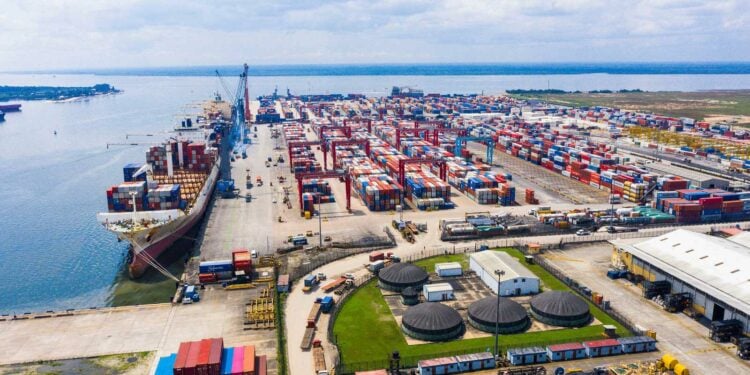The Tin Can Island Command of the Nigeria Customs Service (NCS) has assured importers, clearing agents and other port users of a seamless cargo clearance ahead of the commencement of the Unified Customs Management System (UCMS), otherwise known as B’Odogwu system at the Tin-Can Island Port in Lagos.
LEADERSHIP reports that the B’Odogwu system recently commenced its pilot phase implementation at the Ports & Terminal Multipurpose Limited (PTML).
However, speaking during the World Customs Day celebration titled, ‘Customs Delivering on its Commitment to Efficiency, Security, and Prosperity,’ held at the Command’s headquarters, the Customs Area Controller, Compt. Frank Onyeka explained that whatever teething issues experienced with the B’Odogwu during its pilot phase at PTML have been resolved, and the system is set to boost trade facilitation at the Tin-Can Island Port.
According to Compt. Onyeka, the Tin Can Island Command has adopted innovative approaches to streamline processes, reduce delays, and enhance the ease of doing business for importers and clearing agents.,
“Trade facilitation remains a cornerstone of our work, and at Tincan Island Command, we have adopted innovative approaches to streamline processes, reduce delays, and enhance the ease of doing business.
Through the future deployment of the B’Odogwu (Nigeria Customs Unified Customs Management System), we have automated key procedures, ensure transparency and reduce human intervention.
“The integration of advanced technologies such as blockchain, e-Customs platforms and artificial intelligence have not only enhanced the speed of cargo clearance but also reinforced our commitment to meeting global best practices, as seen in the pilot command PTML.
“Furthermore, the Command has prioritized stakeholders’ engagement as a critical enabler of efficiency. By fostering partnerships with terminal operators, freight forwarders, Shipping lines and regulatory agencies, we have built a collaborative ecosystem that supports seamless operations.
“These efforts have contributed to the Customs’ service improved ranking in The Presidential Enabling Business Environment Council (PEBEC), the Logistics Performance Index (LPI) and the Ease of Doing Business assessments.”
The Tin Can Island customs boss, however, applauded stakeholders, saying their support remained invaluable to the success.
“As we celebrate International Customs Day, let us remember that our work has far-reaching implications for the lives of millions nationally and billions continentally.
“By delivering on our commitments to efficiency, security, and prosperity, we are not only fulfilling our mandate but also contributing to a brighter future for our nation and the global economy.
“To our stakeholders, I thank you for your unwavering support and collaboration, which remain invaluable to our success.”
Also speaking, the Zone A Coordinator, Assistant Comptroller General, Charles Orbih, explained that the Zone is the bedrock of the Service and also represents a critical economic gateway for Nigeria.
According to him, the Zone embodied the strategic importance of the Service in connecting Nigeria with global markets.
“To our esteemed leaders and decision-makers, we call upon you to support our vision. Your strategic investment in our infrastructure, technological capabilities, and human capital is crucial. By empowering the Nigeria Customs Service, you directly contribute to national economic resilience, security, and global competitiveness.
“Today, we recognize the extraordinary contributions of our outstanding officers and stakeholders who have significantly advanced our Service’s mission. People whose inventiveness has enhanced revenue collection facilitated trade and protected our national economic interests.
“As we commemorate this day, I urge every Customs officer to embrace our theme throughout the entire year. Let us demonstrate our commitment through consistent, professional, and innovative service. We must promote this theme in each of our interactions, processes and decisions that we make.
“Our collective actions will determine Nigeria’s economic competitiveness globally and national security,” he stated.



